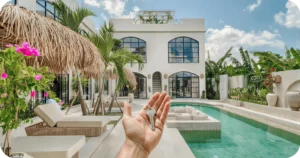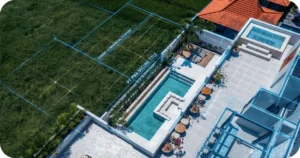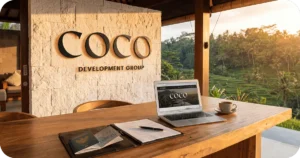Dreaming of creating your slice of heaven in Bali? Whether you’re envisioning a boutique villa nestled in Ubud’s rice terraces or a beachfront property in Canggu, one crucial element stands between your vision and reality: Bali Building Permits. While the island’s vibrant atmosphere and favorable investment climate draw investors worldwide, successfully navigating the local construction regulations can feel like decoding an ancient Balinese manuscript. But don’t let the paperwork dampen your tropical dreams – we’ve crafted this comprehensive roadmap to transform the complex permit process into a clear, manageable journey.
From understanding basic requirements to avoiding common pitfalls, this guide equips both seasoned developers and first-time investors with the knowledge to turn their Indonesian property aspirations into concrete reality, all while staying firmly within legal boundaries.
What Are Bali Building Permits?

If you’re planning to build or renovate property in Bali, understanding the island’s building permit system is crucial. These permits are not just formalities but legal necessities that ensure construction projects comply with local and national regulations. Bali building permits serve as critical regulatory tools to control and guide property development, covering residential homes, commercial establishments, and hospitality venues such as hotels and resorts. Without these permits, a building could not have licences and be deemed illegal to operate, leading to fines, demolition orders, or restricted use.
IMB and PBG
Previously, building permits in Indonesia operated under the Izin Mendirikan Bangunan (IMB) system. However, to streamline processes and enhance compliance with regional planning regulations, the IMB system was replaced with the Persetujuan Bangunan Gedung (PBG). The PBG system offers a more comprehensive framework, focusing on broader building standards and alignment with regional development plans. This shift aims to simplify the permitting process while improving transparency and efficiency in managing building approvals.
The transition to the PBG system is underlined in Government Regulation Number 16 of 2021 (GR 16/2021), officially known as Peraturan Pemerintah Nomor 16 Tahun 2021. This implementation provides the legal foundation for the PBG system, emphasizing the importance of spatial planning and construction norms, addressing challenges in urban and rural development and ensuring that construction projects are well-planned, sustainable, and compliant with local laws. In simple terms, this mandates strict adherence to zoning laws and building standards, mitigating risks associated with unsafe construction practices.
The SLF (Sertifikat Laik Fungsi)
In addition to the PBG, the SLF, or the Certificate of Worthiness, is another essential document in Bali’s construction process that confirms the building is fit for use and has met all the necessary safety, structural, and functional standards. It is issued after the construction is complete and inspections have been conducted to ensure compliance with the approved building plans and regulations.
That said, to obtain an SLF, the building must pass various inspections, covering aspects such as structural integrity, fire safety, sanitation, and environmental impact. The SLF then serves as the final approval, allowing the building to be officially occupied and used for its intended purpose. Failing to secure an SLF can lead to legal repercussions, including fines and restrictions on the building’s use.
Own your COCO property in paradise with benefits for life
- +200 properties in construction
- +250 properties in full operation
- Pay 20% of your property straight from rental profit
Bali Construction Permits Guide: Types of Building Permits

Bali offers different types of building permits, each tailored to various construction needs and property types.
Residential Building Permit (PBG Rumah Tinggal)
The PBG Rumah Tinggal is required for constructing residential properties, including single-family homes and villas or any project intended for permanent living spaces. This permit ensures that residential buildings meet local zoning laws and construction standards. Costs for this type of permit vary depending on the size and location of the project, covering application fees, consultant fees, and inspection charges. For a small house, the PBG starts at a minimum cost of IDR 50,000, with potential increases based on the complexity and scope of the construction. Since this is for basic types of residences only, the process of obtaining one can be pretty straightforward, only requiring minimal yet detailed documentation and compliance with regulations.
Commercial Building Permit (PBG Komersial)
The PBG Komersial applies to all commercial properties in Bali, such as office buildings, retail spaces, hotels, and restaurants. This permit is essential for ensuring that commercial constructions adhere to safety standards, zoning regulations, and environmental considerations. The cost of obtaining a PBG Komersial is generally higher than that of residential permits due to the complexity and scale of commercial projects. For small offices, the PBG permit usually starts at IDR 200,000 but can go up to IDR 50,000,000 as the business grows in size and number. The application process also involves more rigorous scrutiny, including additional requirements like the Pondok Wisata for villas intended as short-term rentals, other business licensing documents, and more comprehensive environmental assessments.
Renovation/Expansion Permit (PBG Renovasi)
A PBG Renovasi is needed when renovating or making significant alterations to an existing building. Whether the changes involve structural adjustments, expansions, or modifications to the façade, this permit ensures that renovations comply with current building standards and zoning laws. The cost and difficulty of obtaining a PBG Renovasi depend on the scope of the renovation, usually coinciding with the amount you paid for when you first applied for a PBG permit for your property. Minor changes may require less documentation and application fee, while significant structural modifications might necessitate a more thorough review process and hefty amount.
Temporary Building Permit (PBG Sementara)
The IMB Sementara is for temporary structures, such as event pavilions, temporary offices, or construction site facilities. This permit is vital for ensuring that even temporary structures adhere to safety and zoning requirements, protecting both the public and the environment. The costs for this permit are generally lower than permanent construction permits, but the application still requires detailed plans and compliance with building safety regulations. The process for acquiring a PBG Sementara is also much quicker and less complicated than for permanent structures, but it still demands careful planning and adherence to local rules.
Invest in Bali’s #1 Lifestyle Property Brand
Discover high-yield villa investments starting at just $50,000 with average returns of 17–20%—all in one of the world’s most sought-after destinations.
Legal Requirements to Obtain Bali Building Permits for Foreigners

Now that you know which specific permit you’ll need for your project, it’s essential to understand the necessary documents you’ll need to prepare to ensure compliance with local real estate regulations and sustainability practices. Each of these requirements plays a vital role in the permit application process and failure to comply with any of these documents will result in fines, delays, or worst—non-approval.
Proof of Land Ownership or Lease Agreement
A proof of land ownership or a lease agreement is the first and perhaps the most crucial requirement you need to provide when applying for a PBG permit. This specific document demonstrates legal rights over the property where the construction is planned. Note that proof typically comes in the form of a land certificate (Sertifikat Hak Milik or SHM) issued by the National Land Agency (Badan Pertanahan Nasional or BPN) for ownership or a notarized lease agreement for leased land.
Architectural Plans and Building Designs
Depending on the type of building you wish to build, you also need to provide architectural plans and building designs (e.g., blueprints) that are detailed and realistic. Of course, these building layout on-site plans should clearly delineate the architecture, structure, and mechanical electrical plumbing (MEP) designs of the proposed project and should be prepared only by certified experts in such respective fields. This ensures that the design complies with safety standards and local regulations.
Expert Tip: What authorities usually look for in these kinds of documents are project feasibility and construction safety.
Environmental Assessment Papers
An environmental assessment, often part of the Analisis Mengenai Dampak Lingkungan (AMDAL) for larger-scale projects, or a simpler environmental assessment conducted by the UKL-UPL for moderate developments, evaluates the potential impact of the construction on the surrounding environment. This assessment is conducted by certified environmental consultants and approved by the local Environmental Agency (Dinas Lingkungan Hidup). It ensures that the project will not adversely affect the local ecosystem and adheres to sustainability practices. Usual cost for the UKL-UPL goes around IDR 10–30 million whereas for AMDAL, costs range between IDR 50-100 million.
For developers and building owners, note that the following are factors considered grounds for disapproval:
- Exploitation of and pollution on the area’s natural resources
- Change (usually negative) in the form of the environment
- Negative impact on the sustainability of natural resources and cultural heritage, if any
Zoning and Land Use Permit
The zoning and land use permit confirms that the construction project aligns with Bali’s zoning laws and spatial planning regulations. This permit, which can be obtained from the local planning office of the area where your property is planned to be built, generally dictates the type of buildings that can be constructed in specific areas. This is also critical to ensure the appropriate building use in connection with its location and that the project complies with the region’s development plan.
Currently, zoning categories in Bali are color-coded, with each color representing a specific type of permissible land use as established by the Badan Pertanahan Nasional (BPN) in 2007. The main zoning categories include residential, commercial, agricultural, and tourism zones, each with its own set of regulations.
1. Green Zones (Agricultural and Conservation Areas)
Green zones in Bali are designated for agriculture and conservation use. These areas are primarily used for farming, forestry, and the preservation of natural resources. For these areas, construction is highly restricted to protect the environment and maintain Bali’s ecological balance. However, projects such as large-scale farming operations, reforestation initiatives, and eco-tourism developments may be allowed with stringent guidelines. That said, building non-agricultural structures in green zones is strictly prohibited, and violators may face fines, demolition of the unauthorized buildings, and possible legal action.
2. Yellow Zones (Residential Areas)
Yellow zones are areas for residential development. This includes homes, villas, apartments, and small community facilities like schools and parks or simply, any project that intends to support small living environments. In these zones, builders can construct residential properties, but any commercial use must adhere to strict guidelines. If non-residential structures are built in these zones without proper permissions, the owner may have to demolish them or face legal consequences.
3. Red Zones (Commercial and Industrial Areas)
Red zones are designated for commercial and industrial use. These areas are suitable for businesses, retail spaces, co-working offices, factories, and warehouses. Specifically, projects like shopping centers, office buildings, and industrial parks are commonly developed here. Any residential or agricultural development in red zones is typically not permitted and would require special exemptions or rezoning.
4. Pink Zones (Tourism Areas)
Pink zones are reserved for tourism-related projects such as hotels, resorts, and villas and are typically found in tourist hotspots like Kuta, Canggu, Seminyak, Ubud and Nusa Dua. These zones are vital for supporting tourism, public, and cultural activities, being strategically situated near beaches, cultural landmarks, and entertainment areas. Building private commercial or residential structures in pink zones is not allowed, and violations can attract severe consequences, including the revocation of permits and restoration of the land to its original state.
5. Orange Zones (Mixed-Use Areas)
Orange zones cater to tourism and mixed-use purposes. These areas can accommodate a blend of residential, commercial, and tourism-related projects, such as hotels, resorts, restaurants, and entertainment facilities. Developers often target orange zones for tourism-driven investments due to the flexibility in land use. As for the international investors eyeing a property in Bali, orange zones present a great landscape to capitalize on the growing tourist and expat community.
It is also important to note that in Bali, orange zones are categorized into vertical and horizontal distinctions to encourage a harmonious integration of commercial and residential developments. Vertical orange zones feature buildings with mixed-use developments, wherein bustling shops and restaurants are built on the ground floor and comfortable apartments or townhouses are situated above. This creates a vibrant and convenient atmosphere. On the other hand, horizontal orange zones feature a design where shops, cafes, and service providers are interspersed among residential neighborhoods, fostering a strong sense of community by allowing residents easy access to daily necessities without having to go far.
Identity Card (KTP/KITAS) and Tax Registration Number (NPWP)
Applicants must also submit an identity card (KTP/KITAS) and a tax registration number (NPWP) to verify their identity and tax compliance. These documents are standard requirements for most formal applications in Indonesia and help the authorities keep track of legal and tax obligations associated with any project.
Additional Documents
Sometimes, additional legal documents like the PBG application letter addressed to the location of interest’s spatial planning agencies, approval letters from the local community leaders, and a statement of no dispute, which must be stamped, are also required to further support your application process and affirm that there are no ongoing conflicts over the land or the construction project.
why investors choose
coco development group?

Passive income on full auto pilot
COCO Development Group take care
all of the matters relating to the lease of your villa
Profit Maximization
We do not just put your property on Airbnb hoping for a guest to book it. More than 40% of our bookings comes today through our own medias, a strong community and a digital and data driven management approach.
A Convenient and fast payment system
The investors receive net profits currency that is convenient for them. we transfer the money once every three months
No need to handle taxes
COCO Development Group deals with accounting, optimization and payment of taxes. we take care of
everything, you just get the money deposited into your account
High Liquidity
We choose the best locations in Bali and don´t just build villas, but create destinations, conceptual complexes with residential and growth. Based on our experience, we can predict an increase in property values by 35% after the construction is completed.
Fast Payback
Oceanside villas in Bali are in High demand for daily rentals. You will earn about 5000 USD per month
Steps to Obtain Bali Building Permits

Obtaining a PBG and SLF in Bali involves a series of detailed steps from document preparation to the actual application process. Here’s a comprehensive guide to help you navigate through the process:
Pre-Application: Consultation and Project Planning
Before starting the actual building permit application process, it is crucial to consult with legal experts and certified architects, engineers, and environmental consultants. This initial step helps ensure that your project complies with Bali’s zoning laws, building regulations, and environmental standards while maintaining project feasibility. Once the project has been thoroughly planned, the next step is to prepare all the necessary documents as outlined above.
Application Submission
With all documents in hand, submit your PBG application through the Building Management Information System (Sistem Informasi Manajemen Bangunan Gedung or the SIMBG). The submission involves attaching all required documents and paying applicable fees. Note that costs may vary per project with small residential developments starting at IDR 50,000, and commercial projects, depending on their scale and the complexity of the development, can go as high as IDR 50,000,000.
Verification and Site Inspection
Upon submission, the local authorities will verify that your project adheres to zoning laws and environmental standards. This step often includes checking your land’s zoning classification through the Badan Pertanahan Nasional (BPN) and ensuring the project does not adversely affect the local ecosystem. An accurate environmental assessment is critical at this stage, as failing to meet these criteria can lead to rejection or required modifications to the proposed project.
Following this verification, authorities will conduct a site inspection to ensure that the construction site aligns with the submitted plans. This inspection is crucial for confirming compliance with structural, safety, and environmental regulations. The inspection process may take several days, depending on the complexity of the project and the availability of inspection personnel.
Approval and Issuance of PBG
Once the inspection and verification are complete and all requirements are met, the PBG will be issued, authorizing the construction project. This document is legally binding and allows you to proceed with your building work under the stipulated guidelines. It’s important to keep this document readily available throughout the construction process as there are usually post-approval inspections to be conducted.
Post-Approval Inspections
During and after construction, post-approval inspections may be conducted to ensure the building complies with all safety, environmental, and structural standards. At this stage, as-built drawings and certifications such as fire safety and sanitation must be submitted. The building must pass all these checks to qualify for the SLF, certifying the structure as safe and suitable for use.
SLF Application and Issuance
SLF application is free and guaranteed once you’ve applied for, paid for, and abide by the stipulations in your PBG permit. In Bali, application for this certificate also goes through the SIMBG website.
Note that this certificate is only issued after construction is complete and the property is cleared of any issues during the post-approval inspections, thereby officially marking the building as fit for use. Additionally, unlike PBG which has lifetime validity except for when you repurpose or renovate your property, SLF needs to be renewed every 20 years for residential buildings and every 5 years for commercial ones.
Experience Peace of Mind With Our 5-Year Warranty
Relax knowing your property is backed by a full 5-year warranty, supported by a team with over 25 years of shared real estate experience.
Common Challenges for Foreign Investors
Although the application process may appear straightforward, acquiring a building permit in Bali can present several challenges, especially for foreign investors. Here are some common hurdles you may encounter when seeking building permits in Bali:
Language Barrier
Most official documents and processes are in Indonesian, making communication a significant challenge. Hiring a translator or a legal professional and consultant also fluent in English is essential to ensure that all legal and regulatory requirements are understood and met.
Complex Regulations
Zoning laws and cultural restrictions in Bali can be intricate and difficult to navigate. Engaging local experts such as architects, lawyers, and consultants is crucial to avoid costly mistakes and ensure compliance with all applicable laws.
Corruption and Delays
Bureaucratic delays and the potential for corruption are common challenges when navigating the permit system in Bali. While bribery or unofficial payments may be used to expedite permits, these practices are illegal and should be avoided by ethical investors. Building a network of reliable local contacts can help expedite processes and reduce unnecessary setbacks while ensuring transparency and compliance with legal standards.
Tips for Successful Permit Acquisition
The best way to have a successful permit acquisition is to follow each step religiously and keep everything legal and ethical. Here are some no-brainer valuable tips to get you that permit smoothly:
Research Thoroughly
Before starting your project, take the time to understand local zoning laws, land use regulations, and cultural considerations. Familiarize yourself with the specific requirements for your building type and location, as this can help you avoid costly mistakes and delays later on.
Work with Reputable Professionals
Partner with trusted architects, lawyers, and contractors who are experienced in navigating Bali’s building permit process. Local experts will have a deep understanding of the regulations, helping you comply with the legal requirements and ensuring that your project moves forward smoothly.
Plan for Contingencies
Allow extra time and budget for unforeseen delays or costs. Planning ahead will help you manage any unexpected challenges that arise during the permit acquisition process or construction phase.
Construction you can trust
We handle all the details – no hassle for you.

5 Years full warranty

20+ Finished developments in Bali by our team

25+ Years of shared experience
FAQ
If you already have the IMB permit in Bali before it was transitioned into PBG, you might still need to apply for a PBG building permit. However, this may depend on specific project conditions and/or changes in regulations.
Building without a permit can result in fines, legal disputes, or even demolition of the structure. It’s crucial to obtain a PBG before starting construction.
The process can take 2–6 months, depending on the complexity of the project and the efficiency of local government offices. Working with a consultant can expedite the process.
Yes, but you must apply for a zoning change and update your building permit to reflect the new use. Consult with local authorities to understand the requirements.
The cost varies depending on the property size, location, and type of construction. Fees typically include application charges, architectural services, and inspections and may be around IDR 50,000–50,000,000.
Building Your Dream Investment in Bali
Navigating Bali’s building permits may seem complex, but with proper planning and the right guidance, it becomes a manageable process. Whether you’re constructing luxury villas, eco-friendly resorts, or office spaces, compliance with local regulations protects you and your investment and ensures long-term success.
Bali’s growing economy and thriving tourism industry make it an attractive destination for real estate investment. By understanding the permit process and partnering with local experts, you can turn your vision into reality.
Ready to invest in Bali? Secure your building permit today and start your journey towards a rewarding investment!

Rasmus Holst is a serial entrepreneur and Co-Founder of COCO Development Group, where he helps drive innovation and growth through strategic business development. He is also the Co-Founder of Estate of Bali and Regnskabshelten.dk, Denmark’s fastest-growing accounting firm, which grew to 35 employees and generated $2.5M in turnover in 2023. Rasmus is passionate about building businesses that create long-term value and impact.













